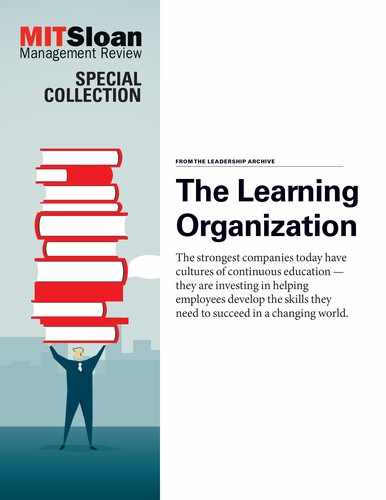The strongest companies today have cultures of continuous education — they are investing in helping employees develop the skills they need to succeed in a changing world. This collection of articles from MIT Sloan Management Review lays out why it’s so important for an organization to embrace a learning culture and how some companies are doing it.
From “Who’s Building the Infrastructure for Lifelong Learning?”:
- The traditional concept of a “three-stage life,” made up of distinct periods of full-time education, full-time work, and then full-time retirement, is becoming untenable now that people are living longer and working longer.
- This is particularly true with regard to education: A one-shot investment in learning is insufficient for a working life that stretches over 60 years and takes place during a time of profound technological disruption.
- But anticipating new types of jobs and providing access to lifelong learning demands a complex system involving educators, governments, and corporations.
- The capability of these multiple stakeholders to deliver lifelong learning is in its infancy.
From “Why Learning Is Central to Sustained Innovation”:
- At many companies, the only things management does that fall under the heading of “people development” are setting an annual training-hours target and allocating funds to a travel budget for sending employees to conferences.
- If employers really think that people are their greatest asset and that it’s the energy and creativity of employees that drives innovation, why do they do so little?
- Operational excellence requires cultivating an aptitude and an expectation for continuous improvement within every employee.
- Companies can foster an environment in which individuals strive to master new skills by repeatedly asking three fundamental questions: What do we need to learn about our customers, products, and production processes to design better products? How do we learn this? And what kinds of organizational structures and routines will best support learning?
From “Preparing for the Coming Skill Shifts”:
- About 80% of U.S. and European CEOs surveyed by McKinsey said they worry about ensuring that their companies have the right mix of skills to thrive in the age of artificial intelligence and automation.
- To address their new needs, companies should focus on retraining their current employees; they won’t be able to find all of the skills they require in the external labor market.
- A key choice is whether to use in-house training resources and programs tailored to the company or partner with an educational institution to provide external learning opportunities. Walmart and German software giant SAP have opted for in-house training programs. AT&T has chosen to work with educational institutions, developing a broad set of partnerships with 32 universities and multiple online education platforms.
- HR departments will need to change the way they work, developing an internal market for talent as well as a marketplace for lifelong training experiments.
From “Governments as Facilitators of Value Creation”
- Many governments are expected to be neutral about business, but governments can also be facilitators of value creation.
- There are many examples of governments acting as facilitators throughout history. In the United States, for instance, building the interstate highway system from the 1950s to 1990s led to much more efficient commerce.
- Two specific ways that governments today can seed experiments in value creation are to encourage entrepreneurship and facilitate education and retraining.
- Government funding for technical education should be made more widely available. In Brazil, for instance, the Brazilian Fund for the Protection of Workers partners with trade unions and government agencies in efforts to provide vocational training.
“Common Traits of the Best Digital Leaders”
- In an MIT Sloan Management Review survey of 4,300 global executives, 68% of the respondents said that their organizations need new leadership to compete.
- MIT SMR’s research identified experimentation as the biggest challenge organizations face in a digital environment. One executive at a consumer products company noted that, in order to be more experimental, his company (1) hired risk-tolerant employees, (2) created an environment where people were encouraged to try intelligently even if they didn’t succeed (and where people were in some cases rewarded for their efforts), and (3) put virtual or physical platforms in place where people could experiment with new ideas and business models.
- While 63% of respondents at maturing companies said their organizations are effectively cultivating the types of leaders they report needing, only 33% of those at developing-stage companies (and just 13% of those at early-stage companies) said they are.
- Leaders must develop new skills to effectively guide their organizations into this uncertain future. The bad news is that few leaders have the necessary skills to do so today.
..................Content has been hidden....................
You can't read the all page of ebook, please click here login for view all page.
